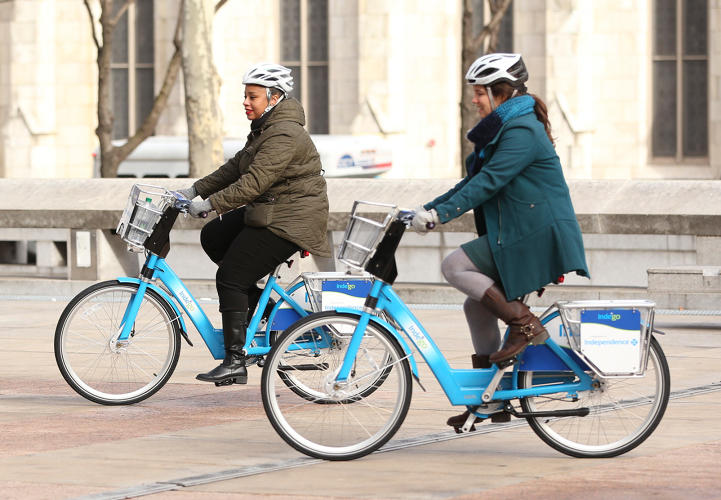by
Anita Hamilton - Fast Company | Apr 17, 2015

Photo Credit Michael Leff
| | Its new program aims to get minorities and low-income residents to hop on bikes by placing stations more equitably and offering a way to pay without a credit card. |
Ever since Washington, D.C., launched the nation’s first publicly funded bike share program in 2008, some 70 cities have followed suit, from Savannah to Seattle. And while some systems have floundered financially—even D.C.’s original SmartBike system shut down in 2011 before its current Capital Bikeshare took off—bike sharing in the U.S. is clearly on a roll. More than a dozen new networks launched in 2014, up from just four in 2010.
But Philadelphia will put a new spin on bike share this spring with the launch of its new Indego program in April. In a departure from other bike share programs around the country, fully a third of the 600 bikes in Philadelphia’s Indego system, with stations made by BCycle, will be located in low-income neighborhoods, and all residents will have the option of paying with cash if they don't own a credit card. "We’re blazing some trails," says the city’s bicycle programs manager Aaron Ritz. "We hope that this will be groundbreaking in a repeatable way."
Despite their increasing success, one area where bike share programs have largely failed is in attracting a diverse ridership. As a rule, bike share users tend to be white, at least middle class, and more often male than female. Even in D.C, where half the residents are black, only 3% of its riders are black, according to a 2013 report on the program. In Boston, which launched its Hubway system in 2011, 80% of riders earn more than the city’s median income of $49,000. New York, which now has nearly 6,000 Citibikes in Manhattan and Brooklyn, has none stationed in the poorest minority neighborhoods.
Considering that most bike share programs are funded at least in part with public funds, such stark lack of diversity is particularly problematic. Philadelphia, for example, is paying for its Indego bike share with $3 million in city funds and $1.5 million from the state. The rest of the program’s $16 million total budget over the next five years comes from a corporate sponsor (Independence Blue Cross) and a nonprofit family foundation. "You can’t just have a lifestyle amenity that is funded by public resources," says Adonia Lugo, a bicycle anthropologist at Bicicultures, an interdisciplinary research collaboration.
That’s why Philadelphia decided to design its bike share system, slated to launch on April 23, to appeal not just to tourists and wealthy residents, but to a larger slice of its nearly 1.6 million residents. That includes the 27% who live below the poverty line and the city’s majority minority population, which is 43% black, 12% Latino, and 6% Asian. "Our bike share will be accessible to underserved communities from day one," says Carniesha Fenwick-Kwashie, grant manager of the Mayor’s Fund for Philadelphia. A $3 million grant from the JPB Foundation is paying for stations in low-income neighborhoods where the median household income is 150% of the poverty line.
While bike stations in poorer areas may not be as profitable as those near tourist attractions like the Liberty Bell or the Rocky Steps, "It was important for us to put the bikes not only in areas that would be a slam-dunk revenue generator," says Ritz.
What’s more, Philly will be the first U.S. city to launch its bike share with a cash payment option available to any resident, regardless of income. (While Boston’s Hubway and Capital Bikeshare also have cash payment options, Boston's is only allowed for residents under a certain income threshold and D.C.'s only for residents of certain areas.) They will need access to a computer and a permanent address to sign up for the 30-day membership, which costs $15 and includes an unlimited number of free one-hour rides. They will receive a key fob in the mail giving them access to the system, and can fund their account at 7-Eleven or Family Dollar stores. An annual Indego membership costs $10 plus $4 per ride, and nonmembers can pay $4 per half hour.
The big question going forward is whether Philly’s efforts to build a better bike share will actually work. "What makes bicycling accessible for people is feeling a sense of belonging or seeing people who look like them riding," says Lugo. Because many low-income people grew up riding public transit, "riding bicycles can be seen as a failure," adds Alison Cohen of Bicycle Transit, which will operate Philly’s network of bikes and stations.
To get the word out, the city is hiring 10 neighborhood "ambassadors" to show residents how to use the bike share and encourage them to do so. It has also teamed up with the Mural Arts Program to create public murals designed by local artists with help from local elementary schoolkids in low-income areas that will draw attention to the stations. A social media campaign called "Where Will Indego Take You?" will ask riders to take pictures of rides to their favorite parts of the city and share them on Facebook, Instagram, and other social media.
Philadelphia’s ambitions don’t end at its city limits, either. It’s teaming up with Drexel University's School of Public Health to study the impacts of bike share on riders’ health over the next three years. And it is working with the national nonprofit People for Bikes to help other cities develop more inclusive systems and transform bike share’s image from a luxury for the rich into an affordable, healthy, and fun alternative for more city dwellers.
See the original article here:
http://www.fastcoexist.com/3044431/world-changing-ideas/has-philadelphia-made-a-bike-share-that-can-get-the-entire-city-biking#5